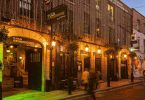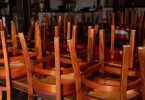Heineken training to re-invigorate lager category
Heineken Ireland intends re-invigorating the lager category through it’s new barstaff training programme ‘The Pint Remastered’.
The brewer demonstrated the main points of its new pub training programme recently when Heineken’s Master Pourer Franck Evers presented the art of pouring the perfect pint of Heineken – and pouring it for more potential profit at that – in the Secret Bar in Dublin’s Fade Street.
“Research conducted by Alison McMahon, Category Development Manager for Heineken Ireland, has found that for every unit of spirits sold, two pints of lager are sold in an on-trade outlet,” explained Paula Hendrick On- and Off-trade Brand Manager for Heinken, “And for every glass of wine sold in on-trade, 10 pints of lager are sold. For every cup of coffee sold in on-trade, 30 pints of lager sold.
“Look at the amount of effort and time put into pouring spirits or a cocktail compared to the time it takes to pour a pint of Heineken. We believe that lager has become a category worthy of more care and attention than is presently given to it. That’s one of the reasons for founding this programme.”
A beer correctly poured and served can increase sales significantly, agreed Dutchman Frank who explained how the head on a beer is important in cutting off oxygen (which can quickly spoil the taste of the beer) and so his ‘perfect pour’ used a knife to remove the top of the frothy head.
By removing the oxygenated part of the head (where O2 has risen to the top of the head above the CO2) the proper head on the beer thus preserves the taste, he argued.
“It’s important to keep ‘fizziness’ in the beer too to stimulate the desire for another,” he explained.
In Holland, Heineken’s ‘Pint Remastered’ training programme has resulted in publicans noticing that they’re selling not only more beer but more bottled water and spirits too, he claimed; so much so, he said, that Heineken now charges the Dutch trade €1,000 to €1,500 per training session, but for the time being it’s currently offering it to the trade here at no extra cost.
Today, draught beer constitutes around 10 per cent of global beer consumption and with Europe being responsible for 27.4 per cent of beer sales (Canadean Global Research), every market there is important to the brewer.
In order to get the best from pouring a Heineken, Frank had a few basic tips for bar staff:
* use branded glassware
* make eye-contact with the customer (which can result in up to 70 per cent more tips, he claims)
* present the beer on a bar mat that ‘faces’ the customer.
With the head on the beer being equally important to stimulating sales, Heineken has put together a four-step ritual in pouring a pint of Heineken that will increase profits for the publican, claims the company.
The four-step Pint Remastered programme results in ‘the same great beer as you’ve never experienced it before’ according to the brewer and it involves:
* The Prep: a cold, wet glass makes the head last longer.
* The Pour: this is the optimum angle (45 degrees) at which to pour the perfect Heineken. Heineken’s new
glassware has appropriate guidelines etched on the sides as part of the new design.
* The Seal: The freshness of the beer is sealed in instantly by the well-poured head. Topping off the excess froth
with a knife does two things – it removes the oxygen that has come to the top of the pint and it removes the
bitterness that has arrived there too, leading to a better-held head and a better-tasting pint throughout.
* The Pint: The presentation of the pint itself in a branded glass with the logo facing out towards the customer and with eye contact.
And Frank had more to enlighten the average beer drinker. For example, “The ‘beer belly’ is really a ‘fat belly’,” believes Frank as the carbon dioxide in the beer tends to stimulate eating and it’s not unknown for revelers to seek something to eat while in or after the pub.
For Frank, clearly, beer is the reason he gets up every afternoon….
So far, Heineken has taken the five-hour Pint Remasterd programme to some 16 pubs in Dublin, 10 in Cork and five in Belfast.
“We hope to have 100 done by the year’s end and more in 2011,” said Paula Kendrick.








